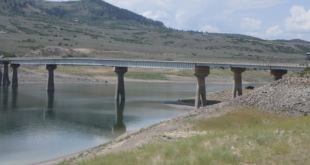Not a done deal; certain requirements must be met by February 1
By Alissa Johnson
The stage is set for the Gunnison Valley Rural Transportation Authority (RTA) to transition to buses run on compressed natural gas (CNG). At the January 15 RTA meeting, the board voted to move in that direction provided that certain conditions are met by February 1.
The RTA is preparing to purchase two new buses, and deciding which buses to order hinges on the possible conversion. Gunnison County has been working to install a CNG fueling station in Gunnison on Highway 50, filling a niche for truckers traveling between Grand Junction and Pueblo. But the county needs the RTA’s commitment to make the project worthwhile.
County commissioner and RTA board member Paula Swenson explained, “Gunnison County is committed, other entities in the valley are talking about it… but there isn’t the volume without the RTA to move forward with CNG for the valley.”
RTA executive director Scott Truex told the board that the decision would be a policy decision because, operationally, CNG buses would come with increased costs. CNG buses cost nearly $170,000 more than diesel buses. The RTA would also need to do some work to the storage and maintenance facilities and provide training for mechanics.
“From a staff point of view, I can’t make a recommendation whether to go with CNG from an operations standpoint, but would recommend that if you go with CNG, we get two CNG buses,” Truex said.
Originally, the RTA had discussed ordering one bus that ran on diesel and one bus that ran on CNG as a test. Truex recommended rethinking that plan in light of a successful test run of a CNG bus and the near-term, likely availability of DOLA (Colorado Department of Local Affairs) grants to cover the cost increases of the CNG bus. One grant has already been secured to pay for 80 percent of the first bus, and the RTA is waiting to hear whether DOLA funds will cover an additional portion of the first bus and $167,000 of the second.
The day before the RTA meeting, Truex and Alpine Express representatives, who operate the RTA buses, participated in a test run of a CNG bus.
Illinois-based MCI (Motor Coach Industries) brought the bus in from California. It made the 7 a.m. run from Gunnison to Mt. Crested Butte in temperatures that were around 20 below zero.

Truex characterized this as a reasonable test, with true winter conditions and a passenger load of 62 people. “If we had been using a Bluebird bus, we would have left people behind,” he said.
“It was simple to drive and well thought-out…” said Stewart Johnson of Alpine Express. “Overall I give it a big thumbs up.”
Woody Sherwood, also of Alpine Express, pointed out that there were far fewer fumes than diesel when the bus was started inside the garage. And while it’s difficult to quantify just how the environmental impact of a CNG bus compares to diesel, the bus’ reduced emissions are considerable.
John Cattles, facilities and grounds director for Gunnison County, told the board that using 2013 models, the CNG bus releases 30 percent fewer carbon dioxide emissions.
“The real big difference is particulates. That’s enormously different, and those are the kinds of things that affect more local emissions, especially in a valley with inversion,” Cattles said.
Mt. Crested Butte mayor David Clayton wanted to know how likely it was for the company to back out if the operation was not profitable. Board member Roland Mason wanted to know what kind of back-up systems would be in place at the fuel station.
A fuel purchasing contract is still being negotiated with Trillium CNG, which would build and run the station with a launch date of September 1. Cattles has been working with the county attorney to do so, including safeguards for the county.
While Truex pointed out that the company’s other stations have had minimal downtime, he appreciated the board’s questions.
“These are all good questions and they need to be worked out in the contract,” Truex said.
“I haven’t heard a compelling reason not to do this… I think we, as the RTA, should show leadership for emissions. I think this is the wave of the future and we should do it for both buses,” said Gunnison mayor Richard Hagan.
“I’ve heard twice this morning that we’re jumping off a cliff. I think this is more crossing the bridge,” said Crested Butte mayor Glenn Michel. He believed the transition was in keeping with action plans adopted in 2009, which emphasized carbon reduction from transportation.
Truex reiterated that the negatives were financial—if the DOLA grants do not continue, future buses will be more expensive—and related to uncertainty about how the buses perform. “I’m much more comfortable with the uncertainty after yesterday’s bus test,” he said.
One member of the public, Crested Butte resident Gabriel Kellman, questioned moving toward CNG because of the controversy over fracking. “My big question with embracing moving toward natural gas is the bigger picture on public lands, especially in Paonia where they’re fighting fracking…,” she said.
Given the cost of conversion, Kellman worried the RTA would miss out on better options in the future. She wanted to know if the short-term benefits would pay off in the long run, given the environmental impacts of fracking.
“In five years, will there be an option for a really clean bus that’s powered by solar and a shining beacon instead of a Band-Aid?” Kellman continued.
“We won’t have a solar bus that we can buy in five years,” explained Swenson, “and this is a step in the right direction as we look at the big picture of emissions, not only in this valley but the world as a whole. Converting to compressed natural gas is a way to help the environment and move forward.”
Ultimately, the board voted in support of the transitioning to CNG, with some caveats recommended by Truex. The details of the fuel purchasing agreement must be worked out and the DOLA grants awarded—both by February 1—in order to move forward.
Truex says that’s not as tall an order as it might sound, given how long the process has been in the works. “Everything points to it [moving forward], but this isn’t a done deal,” he said.
 The Crested Butte News Serving the Gunnison Valley since 1999
The Crested Butte News Serving the Gunnison Valley since 1999






